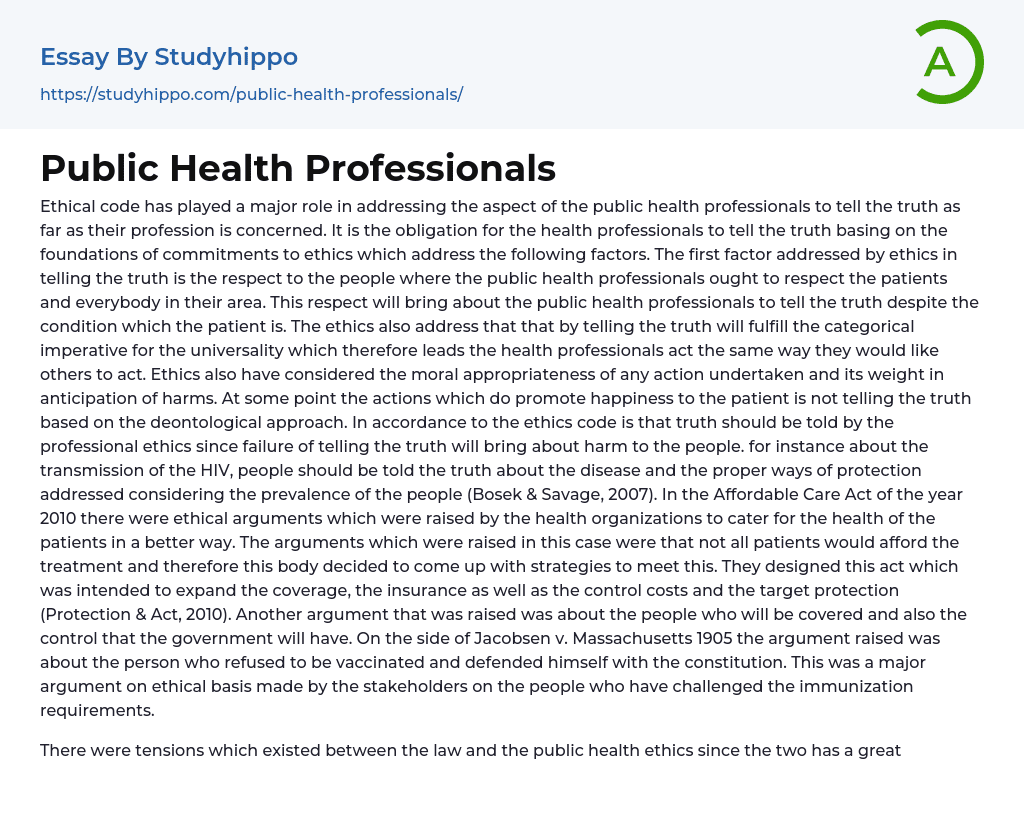The ethical code has significantly influenced how public health professionals are expected to communicate truthful information regarding their profession. These expectations stem from their commitment to ethical principles, which encompass various factors.
The first ethical factor concerning truth-telling is the respect shown towards individuals, particularly patients and everyone within their community. This respect encourages public health professionals to tell the truth regardless of the circumstances surrounding the patient. Ethics also emphasizes that telling the truth aligns with the principle of universality, where health professionals should act in the same manner they would expect others to act. Additionally, ethics evaluates the moral appropriateness and potential harm of any actions undertaken. Under a deontological approach, there may be instances where not telling the truth promotes happiness for the patient. However, according to the ethics code, profess
...ionals should prioritize truth-telling as failure to do so can cause harm to individuals.
It is crucial to educate people about HIV transmission and proper protection methods, considering its prevalence in the population (Bosek & Savage, 2007). The introduction of the Affordable Care Act in 2010 sparked ethical discussions within healthcare organizations aimed at enhancing patient care. One major concern was the affordability of treatment for all patients, leading to the development of strategies to address this issue. The Act sought to expand coverage, offer insurance, control costs, and provide targeted protection (Protection & Act, 2010). Moreover, debates arose regarding who would be covered and the extent of government control. These discussions also referenced Jacobsen v., raising further arguments.
In 1905 in Massachusetts, there was a heated debate concerning an individual who refused to receive a vaccination and defended their stance using the constitution.
This disagreement centered around the ethical considerations raised by those who challenged vaccination requirements. The tension between the law and public health ethics was significant, as it directly impacted human lives. The issue stemmed from conflicting notions of personal liberty, which covers freedom from bodily invasion. The Massachusetts law initially justified its restrictions on individual liberty.
According to Gostin (2005), tension arises between the Affordable Health Care Act and public health ethics because the law grants individuals the right to make choices in their lives, while also requiring everyone to have insurance, thus potentially depriving them of their rights. To make decisions that consider both public health ethics and the law, it is essential to conduct ethical analysis. Before taking any action with a client, both the law and professional ethics should be reviewed. Government intervention is involved in both cases to ensure the accomplishment of desired goals. Social justice mandates that patients and everyone else be treated justly in accordance with the law and professional ethics. Professionals in the public sphere must recognize that patients have rights that should be protected (Childress et al, 2002).
An individual's autonomy is ensured because each person has their own way of living. These issues are addressed in cases to ensure that patients receive the best services.
References
- Childress, J. F., Faden, R. R., Gaare, R. D., Gostin, L. O., Kahn, J., Bonnie, R. J., ... ; Nieburg, P. (2002). Public health ethics: mapping the terrain. The Journal of Law, Medicine ; Ethics, 30(2), 170-178.
- Gostin, L.
O. (2005). Jacobson v Massachusetts at 100 years: police power
and civil liberties in tension. American Journal of Public Health, 95(4), 576-581.
Protection, P., ; Act, A. C. (2010).
Patient protection and affordable care act. Public Law, 111, 48.
Bosek, M. S. D. W., ; Savage, T.
The source is a book titled "The ethical component of nursing education: Integrating ethics into clinical experience" written in 2007 by a Philadephia-based publisher, Lippincott Williams & Wilkins.
- Social Care essays
- Epidemiology essays
- Drug Addiction essays
- Hiv essays
- Hygiene essays
- Obesity essays
- Teenage Pregnancy essays
- Birth Control essays
- Eating Disorders essays
- Causes Of Obesity essays
- Children Obesity essays
- Affordable Care Act essays
- Addiction essays
- Anatomy and Physiology essays
- Biodegradation essays
- Cancer essays
- Dental Care essays
- Disability essays
- Disease essays
- Disorders essays
- Health Care essays
- Infectious Disease essays
- Inquiry essays
- Intelligence Quotient essays
- Lung Cancer essays
- Medicine essays
- Neurology essays
- Nutrition essays
- Olfaction essays
- Physical Exercise essays
- Public Health essays
- Sex essays
- Women's Health essays
- World health organization essays




